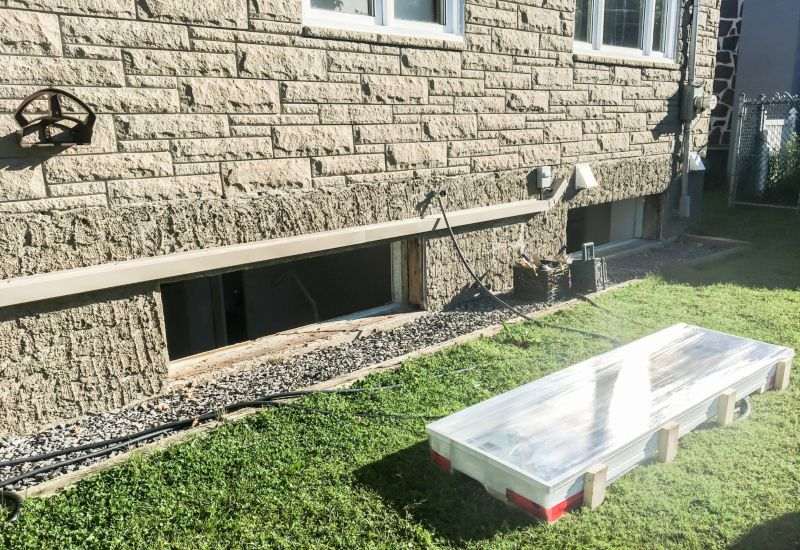Warm Weather Basement Maintenance
 Summer is upon us, and while temperatures are hitting record highs across the country, humidity is soaring as well. That’s bad news for your basement because while humidity makes everyone feel sticky and uncomfortable, it can cause major problems in your basement. What’s more, summer storms are notorious for flooding basements in Maryland. When your basement is too damp, it raises the humidity in the rest of your home as well, leading to even more issues. Fortunately, you can be proactive in taking care of your basement, in order to keep it nice and dry all summer.
Summer is upon us, and while temperatures are hitting record highs across the country, humidity is soaring as well. That’s bad news for your basement because while humidity makes everyone feel sticky and uncomfortable, it can cause major problems in your basement. What’s more, summer storms are notorious for flooding basements in Maryland. When your basement is too damp, it raises the humidity in the rest of your home as well, leading to even more issues. Fortunately, you can be proactive in taking care of your basement, in order to keep it nice and dry all summer.
The first step in maintaining your basement is to know how much humidity is present.
When you understand the situation, you’ll be better able to deal with it. You can measure the humidity in your basement using a humidity reader, called a hygrometer, that you can easily find online or at a home improvement store. Even if you don’t have a hygrometer, though, you can tell if the humidity in your basement is too high, because there will probably be condensation on the basement walls and surfaces. When the moisture in the basement becomes extreme, you may even see rot or mold growth. Humidity will vary as the weather varies, but in Maryland, a good average humidity in the basement will range between 40 and 60 percent.
Once you’ve got a handle on the humidity levels, it’s time to determine why it’s as high as it is.
If your basement hasn’t flooded, and you don’t know of any leaks, there are a few factors that could be causing your basement’s humidity. The soil around your basement may be oversaturated, which can cause water to seep into your basement walls. You might also have a dryer or other appliance venting inside the basement, there could be water under your foundation, or humid air may be leaking into your basement somehow.
A dehumidifier can help you take charge of your basement’s humidity.
If your basement is large, you may need several of these, but start with one and see if it sufficiently reduces your humidity. If you can get the humidity in your basement below 50 percent, that may be all you need to do. Dehumidifiers come in many different sizes so shop around to find the one that works best for you.
Make sure your sump pump is working properly.
If your basement has a sump pump, it should be turning off at the proper put level, and automatically turns off when the level goes back down. Clean the sump pump’s strainer screen, and if the pump is discharging on the ground, make sure it’s carrying the water away from the house. If the discharge is below ground, check it for leaks, and if the sump pump is more than five years old, consider replacing it.
Get the right air moving around your basement.
You might think that opening a window will let hot, humid air escape, but opening the doors and windows to your basement during the summer can actually let more humidity in. You do need movement in the air, though, so if connecting your basement to your central HVAC isn’t an option, consider setting up an A/C unit or using fans to improve circulation. You should also make sure your basement is well insulated against warm outside air and water vapor, taking care to fix any cracks or gaps around vents and pipes.
Prevent water from getting in from outside.
Check your home’s gutters and downspouts, making sure the gutters are in the right position and the downspouts are properly connected. The downspouts should point away from your foundation, diverting water at least five feet away so it doesn’t pool against the foundation and seep into the basement. You should also check to see that the grading above your foundation slopes away from the house, so that water also flows away. If your basement has windows that sit below the grade, make sure they have wells around them on the outside, to provide good drainage and prevent water from coming into the house.
Use several methods to stay on top of the problem.
Keep an eye out for mold, which can manifest as dark areas on walls and floors, as well as furniture and storage boxes. Don’t store things in cardboard boxes, which can promote mold growth. Consider installing water alert leak detectors near potential problem areas like water heaters, boilers, and sump pumps. These can be simple devices that provide audio alerts to leaks, they can tie into our home security monitoring, or they can send alerts to your cell phone.
If you really want to take charge of your basement and make sure it’s properly maintained, it may be time to call in a professional. At Budget Waterproofing, we’ve got more than 55 years of experience servicing both commercial and residential customers throughout Maryland. We’re proud of our craftsmanship and confident in our skills, and all of our technicians are fully licensed, insured, and bonded. Whether your problem is moisture, humidity, or mold in your basement, we have the experience and know-how to provide the solution. For more information, call 410.690.4970 or contact us through our website.
